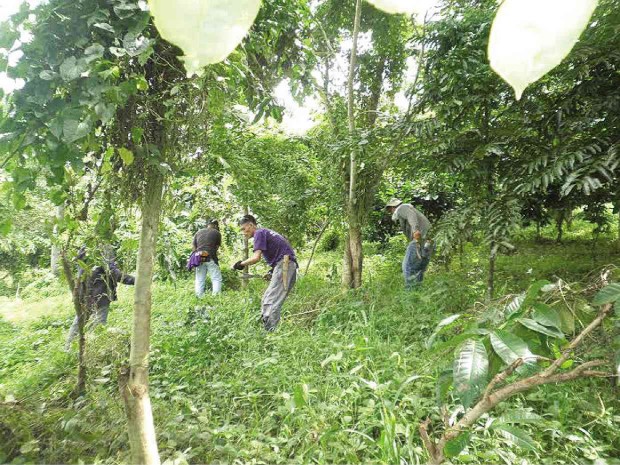CamSur forest destroyers now tree nurturers

EL VERDE Project participants clean the reforested area of Barangay Pamplona in Del Gallego, Camarines Sur, where trees planted five years ago are thriving. JUAN ESCANDOR JR.-
MARIMAR de Castro, 31, married young and now has six children. In years past, she and her husband put food on the table for their large family by cutting trees and turning them into charcoal.
The couple’s life started to change when they planted bamboo and trees under the El Verde Project of the provincial government of Camarines Sur in 2012. “We were able to build a new house [with galvanized iron roof sheets], buy a television set and a motorcycle, and send our children to school,” De Castro says.
De Castro, whose family used to live in a hut, is among the beneficiaries of the El Verde Project in the upland village of Pamplona. The community sits on a plateau 12 kilometers from the Andaya Highway, bordering the town of Labo in Camarines Norte province.
Nomer Bienvenido, 42, has also been weaned off from cutting trees and making charcoal for a living because of El Verde. He is one of the first partners of the project founded by the provincial government under then Gov. Luis Raymund “LRay” Villafuerte in February 2011.
“The provincial capitol first sent a batch of 1,700 seedlings, but people here rejected this type of project. No one wanted to work,” Bienvenido says.
Through the El Verde project, beneficiaries receive food and cash for planting and nurturing bamboo and trees.
Project officer Lucena Bermeo says El Verde is a combined food-for-work (60 percent) and cash-for-work (40 percent). Under this payment scheme, a bamboo seedling, for example, is worth P25 in the nursery establishment, so 60 percent will be paid in the form of rice and 40 percent, cash.
Bermeo says the project is sustained by the provincial government’s environmental fund as part of its climate change mitigation measures.
The reforestation project, in the past three years, had spent P8 million for every 500 hectares, provincial government records showed.
Bienvenido says residents were initially suspicious that the project was the provincial government’s way of grabbing land from the community. It came to a point, he says, when a group of residents barricaded the village road to prevent government trucks from delivering sacks of rice to project beneficiaries in the uplands of Del Gallego.
21 million trees
He recalls an instance when the project’s bunkhouse and cassava plantation were burned down by unidentified people.
“But we continued with El Verde in our village, whatever it may cost. Most people’s livelihood here is charcoal making and tree cutting. If we will not accept this kind of project, our sufferings continue,” he says.
Since 2011, more than 21 million trees have been planted under the El Verde Project in the upland and coastal areas of Camarines Sur. The project holds two Guinness World Records for planting the most number of trees in 15 minutes and one hour, says Camarines Sur Gov. Miguel Villafuerte, who replaced his father as governor in 2013.
“More importantly, it has already planted a seed of hope to around 1,300 families who are not mere beneficiaries, but partners in this project,” the younger Villafuerte says.
The El Verde area in Del Gallego covers 7,000 hectares under a comanagement agreement with the Department of Environment and Natural Resources and the provincial government.
The area is classified as a timberland and used to be a logging spot that was opened to concessionaires. Years of commercial logging had depleted the area’s resources, with only cogonal grassland and patches of trees along the riverbank left there, Villafuerte says.
The number of remaining trees dwindled as residents, who had no other livelihood, turned to cutting trees so they can turn these into charcoal.
Angelina Jesalva, 46, another Pamplona resident whose family once earned from charcoal making, says the project has encouraged her to plant trees, instead of cutting them.
Jesalva’s family lost their house when Typhoon “Glenda” (international name: Rammasun) pummeled the Bicol region in July 2014, so they were forced to live in the barangay hall for three months.
Through the project, she says her family was able to rebuild their house and afforded a TV set.
Cash and rice
Rolando Brigonia, 39, who used to earn P1,000 a month as a charcoal maker, says he received in Dec. 20, 2015 sacks of rice and cash as payment for planting 10,050 trees.
Brigonia says that in the past two years that he has been involved with the project, he was able to build a house and buy household appliances. He also bought a carabao which he now uses to till a parcel of land.
Jesusita Marqueta, another project beneficiary, is building a sturdier house with their savings. Her family earned also 20 sacks of rice for planting trees.
George Valdez, 43, used his earnings to support his 17-year-old son’s education, buy a motorcycle and put up a small sari-sari store.
Maritess Abanilla, 44, is delighted at receiving cash and rice as payment for her effort. “There were times when a new stock of rice would arrive even as we have yet to consume the previous stock,” she says.
The money she receives from the project she uses for her son’s school allowance and transportation expenses.
Fernando Opiana, 39, a coconut farmer and a former part-time charcoal maker, is happy that from earning only P1,500 a month, he now gets at least P5,000 through the El Verde project.
“So whenever we hear stories of beneficiaries quitting the project, we feel sorry,” Opiana says.














